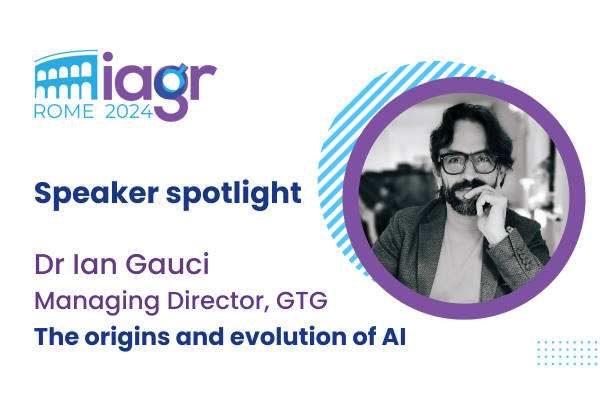
The Origins and Evolution of AI: A Narrative Journey
Article by Dr Ian Gauci
Dr Gauci is the Managing Partner of GTG, a technology-focused corporate and commercial law firm that has been at the forefront of major developments in fintech, cybersecurity, telecommunications, and technology-related legislation.
Dr Gauci will participate in a panel discussion at the IAGR IMGL 2024 Rome conference titled ‘Are gambling regulators equipped to regulate an increasingly AI-driven industry?’

A brazen head in a 1905 depiction
The Origins and Evolution of AI: A Narrative Journey
The narrative of Artificial Intelligence (AI) is a captivating tapestry intricately woven with the threads of human history, culture, and technological progress.
Myths and legends often featured intelligent machines. In Homer’s Iliad, Hephaestus crafted automatons, reflecting an early human fascination with creating life-like machines. Similarly, the myth of Pygmalion, who fell in love with a statue he created, highlights the desire to imbue the inanimate with life. Similarly, the Middle Ages brought us the legend of the brazen head of Albertus Magnus, a talking automaton, a tale that vividly portrays the mix of fascination and fear surrounding artificial beings. These early narratives, with their themes of creation, control, and the potential consequences of intelligent machines, laid the very foundation of modern AI.
From ancient myths to modern-day applications, AI has evolved to reflect diverse experiences, societies, and languages. This narrative explores the origins of AI, its early uses in entertainment, its impact on gambling and gaming, and the effects of regulatory measures such as the AI Act and standards like ISO 42001.
The Evolution of AI as a Concept

‘Do Androids Dream of Electric Sheep’ first edition cover
The modern concept of AI began to take shape in the mid-20th century. The Dartmouth Conference 1956 marked the official birth of AI as a field of study. Early AI research focused on symbolic reasoning and problem-solving, developing the first AI programs.
As technology advanced, AI began encompassing a broader range of applications, including machine learning, natural language processing, and robotics.
Fictional narratives continued to influence public perception and scientific exploration. Isaac Asimov’s robot stories and Philip K. Dick’s Do Androids Dream of Electric Sheep? offered nuanced portrayals of AI, exploring themes of identity, ethics, and the boundaries between humans and machines.
AI in Entertainment, Gaming & Gambling
AI found early applications in entertainment, particularly in gaming. One of the most notable instances was IBM’s Deep Blue, which defeated world chess champion Garry Kasparov in 1997. This event showcased AI’s potential to outperform humans in complex tasks, sparking excitement and concern about its capabilities.
AI has revolutionised player experiences in the gaming industry by creating more immersive and dynamic environments. AI algorithms can learn from player behaviour, adapt game difficulty and provide personalised experiences. This technology enhances entertainment and raises ethical questions about data privacy and player manipulation.
The gambling industry has embraced AI for its ability to analyse vast amounts of data and optimise operations. AI helps set odds, detect fraudulent activities, and enhance customer service. It also plays a crucial role in responsible gambling measures, identifying problematic behaviour and enabling timely interventions.
However, integrating AI into gambling comes with regulatory challenges. The European Commission’s draft AI regulation aims to ensure that AI technologies are used ethically and transparently. To comply with these regulations, gambling operators must adhere to high standards of data management, risk assessment, and user transparency.
Let’s amplify these principles to comprehensively garner a better understanding of the extent of AI’s impact on this industry.
The AI Act: High-Risk AI, Banned AI & Gambling
The recently approved AI Act classifies AI systems into several categories based on risk levels. High-risk AI systems include those that could affect people’s fundamental rights or safety. Under the AI Act, gambling operators must evaluate whether their AI systems fall into the high-risk category. For instance, AI used to monitor and intervene in problematic gambling behaviour or automate game decision-making processes could be considered high-risk due to their potential impact on users’ well-being and financial status.
To comply with the AI Act, gambling operators deploying high-risk AI systems must implement robust risk management frameworks, ensure transparency, and document their AI systems’ functionality and decision-making processes. This includes regular audits and the ability to deactivate AI systems in emergencies often called a “kill switch”.
Based on the same risk classification, the AI Act also prohibits specific AI systems. For the gambling industry, this means that AI systems designed to manipulate or exploit users, such as those that can predict and influence gambling behaviour to increase spending, will likely be banned. These systems pose significant ethical and safety concerns, as they can lead to problem gambling and financial harm. The AI Act will capture and regulate AI technologies that lack transparency, accountability, and fairness, ensuring that gambling operators cannot use AI to advantage themselves at the expense of consumers unfairly.
The use of AI for Regtech & Suptech
AI has become an indispensable tool for regulatory technology (RegTech) and supervisory technology (SupTech) in the gambling industry. By leveraging AI, gambling operators can enhance compliance with regulatory obligations stemming from the Digital Services Act (DSA), Anti-Money Laundering (AML) regulations, and other legal requirements.
For instance, AI can help gambling operators monitor and analyse real-time transactions to detect suspicious activities indicative of money laundering. Machine learning algorithms can identify patterns and anomalies that may go unnoticed by human analysts. This proactive approach enables operators to comply with AML regulations by promptly reporting suspicious activities to relevant authorities.
AI can also assist in ensuring transparency and accountability in advertising and content moderation, which is mandated by the EU Digital Services Act. AI-driven content filtering systems can detect and remove illegal gambling advertisements, protecting minors and vulnerable individuals from exposure. Additionally, AI can enhance user verification processes, ensuring only eligible individuals can access gambling platforms.
ISO 42001 and Quality Management in AI
ISO 42001, a forthcoming standard for AI, will provide guidelines for developing and implementing AI systems that are safe, reliable, and ethically aligned. Adherence to ISO 42001 will be crucial for the gambling industry to ensure that AI systems are designed with robust quality management frameworks, risk assessment protocols, and user transparency.
The ISO 42001 standard will likely include requirements such as:
- Risk Management Systems: Providers must establish, implement, document, and maintain a risk management system. This includes identifying the AI system’s foreseeable risks, analysing data from post-market monitoring systems, and ensuring that risks are eliminated or adequately mitigated.
- High-Quality Data Sets: High-risk AI systems must be trained, validated, and tested using high-quality data sets that are relevant, representative, error-free, and complete. Proper data governance and management practices are essential to meeting this requirement.
- Technical Documentation and Record Keeping: The design of high-risk AI systems must enable tracing back and verifying their outputs. Providers are required to retain technical documentation that reflects the AI system’s conformity with regulatory requirements.
- Quality Management System: Providers must implement a quality management system to ensure consistent and reliable performance of AI systems. This system should cover all stages of the AI system’s lifecycle, from design and development to deployment and monitoring.
- Transparency and Information for Users: Users must be able to understand and control how a high-risk AI system produces its output. Clear information about the AI system’s functionality and decision-making processes must be provided to users.
- Human Oversight: High-risk AI systems must be designed to allow effective human oversight. This includes mechanisms for human intervention, such as a “kill switch,” to deactivate the AI system in case of malfunction or unethical behaviour.
- Robustness, Accuracy, and Cybersecurity: High-risk AI systems must resist errors and malicious attacks. They must meet high standards of accuracy and cybersecurity to protect user data and maintain system integrity.
- Authorized Representative: Providers outside the EU must appoint an authorised representative within the EU to ensure compliance with the regulatory requirements.
The AI Act and ISO 42001 are pivotal in shaping AI technologies’ ethical and safe deployment. ISO 42001 provides a structured framework for developing, deploying, and maintaining AI systems, ensuring that they are reliable, secure, and ethically sound. This standard emphasises risk management, transparency, and accountability, which are critical components of the AI Act.
By adhering to ISO 42001, gaming operators can demonstrate their commitment to high standards of AI governance, which will facilitate smoother compliance with the AI Act’s stringent regulations. Additionally, ISO 42001 encourages continuous improvement and regular audits, helping gaming operators stay updated with evolving best practices and regulatory requirements. This proactive approach mitigates risks associated with AI deployment and builds trust with stakeholders, including customers, regulators, and the public.
Ultimately, compliance with ISO 42001 positions gaming operators favourably for the AI Act, ensuring they are well-prepared to meet its demands and contribute to AI technologies’ responsible and ethical use.
Human-Centric AI in Gambling
Human-centric AI ensures that AI systems in the gambling industry prioritise user well-being, fairness, and transparency. This approach is crucial for fostering trust and protecting vulnerable individuals from the potential harms of gambling addiction and unethical AI practices.
By integrating human-centric principles, gambling operators can enhance customer experiences while adhering to regulatory requirements. AI systems designed with user-centric considerations can identify and mitigate problematic behaviour, offering timely interventions and support. This promotes responsible gambling and aligns with ethical standards and regulatory frameworks, building a sustainable and trustworthy gambling environment.
Human-centric AI also addresses the ethical implications of AI deployment, ensuring that technology augments human capabilities and respects individual rights. In the gambling sector, this means developing AI systems that are transparent, fair, and accountable, fostering an environment where users feel safe and valued.
In Conclusion
The narrative of AI is a journey through human imagination, technological innovation, and societal transformation. From ancient myths to modern regulations and standards, AI continues to evolve, reflecting and shaping the world around us. As we move forward, balancing innovation with ethical considerations, governance, and human centricity is essential to ensure that AI serves the greater good while respecting human values and rights.
Disclaimer: This article is not intended to impart legal advice, and readers are asked to seek verification of statements made before acting on them.







